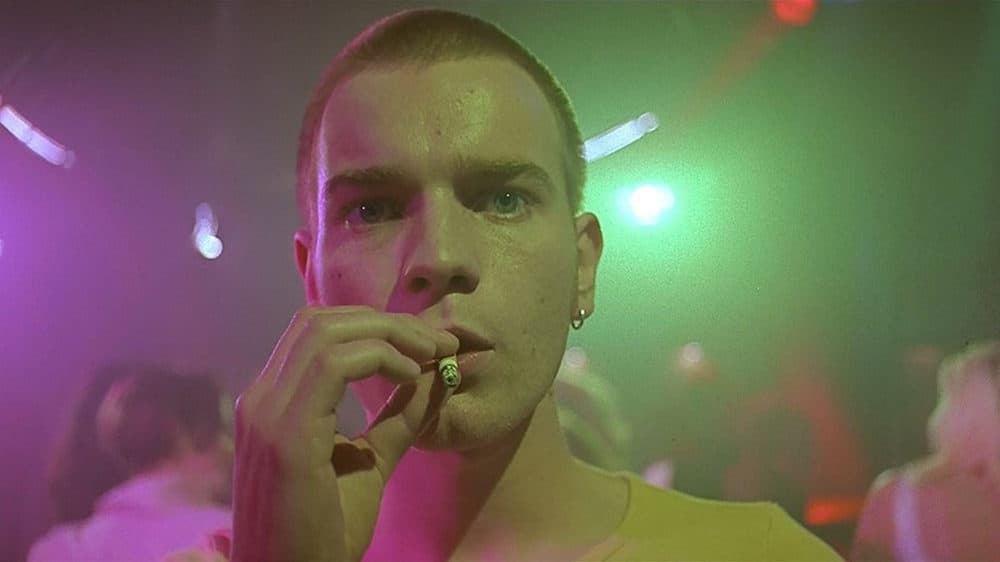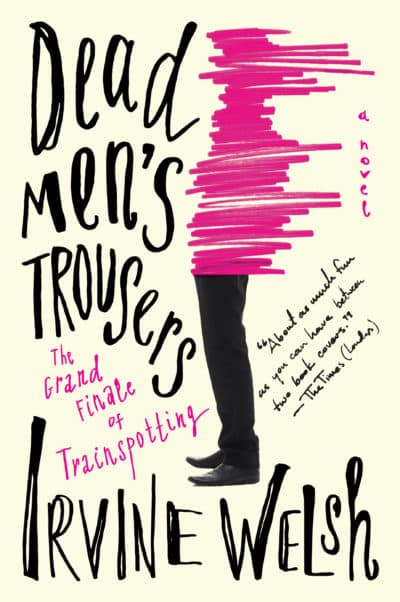Advertisement
Final Book In 'Trainspotting' Series Remains A Window Into Transgression And Misogyny

“Trainspotting” author Irvine Welsh has returned to the scene of the crime with “Dead Man’s Trousers,” his 12th novel. Many crimes, actually, committed by four, not-so-young-anymore Scottish men. They take place on their native turf of Edinburgh, and also in Las Vegas, London, Barcelona and Berlin.
“Trainspotting,” published in 1993, was a non-linear work that thrust us into a grimy youth subculture. The four main players — Begbie, Renton, Sick Boy and Spud — were schemers who abused hard drugs and lived delusional, messed-up lives with mindsets ranging from amoral and avaricious to psychopathic. Welsh cut all this with the darkest of comic wit.
Grim as it was, the novel was also laugh-out-loud funny, as was the 1996 movie directed by Danny Boyle, starring Ewan MacGregor and Robert Carlyle.
The same goes for “Dead Man’s Trousers,” out Tuesday, Feb. 26, the fourth and final book in the series. It features the same four protagonists and hits the same high/low marks as “Trainspotting” did. The tale is appalling, transgressive, politically incorrect, spit-take funny, and, in some sobering ways, an examination of misogyny and toxic masculinity.

We find our main men to be middle-aged and, although perhaps marginally wiser, not quite straight. They’re forever tempted by illegal substances and still into drug deals, con games and payback. The advance hype tells us one will not make it out alive.
It’s not a book Welsh anticipated writing. During the planning stages of “T2 Trainspotting” — the 2017 movie roughly based on “Porno,” the second book in the series — Welsh was holed up in an Edinburgh flat talking with director Boyle, producer Andrew MacDonald and writer John Hodge.
“It got me thinking: These guys would be older. What would they be doing now?” says Welsh, on the phone from his Miami home. “Renton would still be in music. [He manages DJs.] Spud would still be struggling with drugs and drug addiction. Sick Boy would also be doing the same thing, scamming, maybe playing at a higher level, but still be ducking and diving and manipulating women. The joker in the pack was Begbie.”
The most crazed and vicious of the four, Begbie had appeared in other Welsh works — "coming out of jail for violent cameos" — but Welsh says he had to “completely reboot him and give him a second life.”
Begbie changes his name to Jim Francis and re-fashions himself as a successful artist in LA, a collegial, thoughtful man, or so it seems.
“It was quite an unlikely second life in some ways,” Welsh says, “but also an archetypal one, too — the violent prisoner who discovers art. That’s much a thing in Scottish culture and I think in other cultures, as well.”
It’s not a breezy read. The plot is labyrinthine and, perhaps, secondary to the exploration of dubious characters. And like Anthony Burgess in “A Clockwork Orange,” Welsh sometimes employs an almost alternative language when his characters speak. It’s a phonetic dialect Welsh terms “urban east central Scotland working class.”

Welsh allows that can be intimidating for readers — "You don’t get the biggest audience abroad in some countries” but adds, “You do get a very clued-up audience that likes a bit of a challenge.”
In “Dead Man’s Trousers,” the lads each have their schemes and dreams. There are putative attempts at redemption. They eschew drugs, do drugs and then reckon with the consequences.
In Sick Boy’s voice, Welsh writes: “Drink and drugs are a whippersnapper’s game: there is little worse than a hangover or an E comedown after you hit fifty. … as the facts have to be faced; the meager, diminishing returns of fun to be squeezed out in no way justify the subsequent horror show.”
Welsh considers drugs a given part of modern life. “How would you actually imagine a world without drugs?” he asks. “It’d be almost impossible to consider what that may be like. So many things are made through people ingesting drugs. Our whole culture, our whole social life is about people ingesting drugs and becoming intoxicated.”
Welsh, 60, knows of what he writes, admitting to fairly prodigious use when younger. He still uses occasionally, but says, “You just get to the point where you’ve done enough physiologically and psychologically, they don’t work in the same way. The intoxication gets less and less and there’s the tiredness and the lethargy and the comedown.”
What happens, suggests Welsh, pertaining to both himself and his characters, is this: “You stop associating drink and drugs with good times and fun and you start associating them with really crap times. But again, you have to think to yourself — ‘Look, you’ve done your share when you were younger and it was absolutely great, so I can’t dissuade anybody else.’ ”
